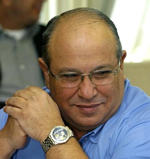Ex-Israeli spymaster talks too much?
By Pierre Klochendler | Last updated: Jul 7, 2011 - 1:52:06 PMWhat's your opinion on this article?

Meir Dagan
|
According to Israel's Channel Two June 19, the former head of the Mossad intelligence agency Meir Dagan was told to return his diplomatic passport immediately. The report suggested the spy talked too much on sensitive matters such as Iran's nuclear quest and the Palestinian drive for UN-endorsed declaration of statehood.
The television report assumed that the request might point to a desire “to get even” with Mr. Dagan, an outspoken critic of Prime Minister Benjamin Netanyahu.
In reaction to the report, the Prime Minister's office stated matter-of-factly that “diplomatic passports are given to officials in order to assist them in their duties. According to the regulation, an individual no longer assuming an official position is requested to forgo his document.”
The Foreign Ministry, the statement added, allowed Mr. Dagan to keep his diplomatic passport for upcoming trips. Upon his return from abroad, he should return it immediately.
Yet, the decision is unusual. Customarily, a person who was issued such passport and is no longer assuming official responsibilities is allowed to use it until its expiration.
Mr. Dagan has indeed made several controversial public statements in recent weeks and months. In May, during a conference at the Hebrew University of Jerusalem, he declared bluntly that a military action against Iran would be “a stupid idea.”
Then, at Tel Aviv University in June, Mr. Dagan declared that an attack on Iran “would mean regional war and in that case you would've given Iran the best possible reason to continue the nuclear program. The regional challenge that Israel would face would be impossible,” he stressed.
Mr. Dagan also warned that Israel could be ostracized as a result of the lack of a peace initiative with the Palestinians. He bemoaned the fact that successive leaders had discounted the Saudi peace initiative of 2002 which pledges full diplomatic ties with Israel in return for full withdrawal from the Palestinian occupied territories.
In recent months, other top security chiefs have retired. They are Chief-of-Staff Gaby Ashkenazi; head of the General Security Service (Shin Bet) Yuval Diskin; and Amos Yadlin, chief of Military Intelligence. With Mr. Dagan, the three have been widely regarded by security analysts as moderate forces within the decision-making process.
In contrast to Mr. Dagan, the retired officers have largely refrained from publicly expressing their personal views. They have kept a facade of statehood and officialdom. Yet, the controversy around Mr. Dagan's passport led Mr. Ashkenazi to break his silence, albeit cautiously. “I trust the new heads of security will not hesitate to express their positions in the proper forums,” he declared.
The final straw that seems to have broken Mr. Netanyahu's tolerance to Mr. Dagan's criticism was recent interviews given by the latter to Israeli newspapers in which he questioned the judgment of the prime minister and his Defense Minister Ehud Barak.
Mr. Dagan was quoted as saying that he “decided to speak out because when I was in office, Diskin, Ashkenazi and I could block any dangerous adventure … now I'm afraid that there's no one to stop Bibi and Barak,” he added, using Mr. Netanyahu's nickname.
Mr. Dagan enjoys the admiration of fellow Israelis for his impeccable record under three prime ministers as Mossad chief. According to foreign media reports, he took charge of several brazen operations regarded as important security achievements, such as causing a delay of at least three years in Iran's nuclear program by cooperating on the Stuxnet worm to the sabotage of the computers that regulate its centrifuges, and commanding the elimination of Iranian scientists.
He is also credited for preparing the groundwork for the 2007 bombing of the Syrian nuclear reactor in Deir al-Zor. And, he reportedly masterminded the assassination of Hezbollah's chief of operations Imad Mughniyeh in Damascus a year later.
One of the latest known infamous operations which Mr. Dagan allegedly masterminded was the assassination in Dubai last year of Mahmoud al-Mabhouh, a high-rank Hamas operative involved in arms purchasing from Iran and subsequent smuggling to Gaza.
Ironically, the Dubai police inquiry demonstrated that forged foreign passports from several countries with whom Israel has friendly relations were used during the operation. The findings caused embarrassment and ire in these countries. The UK and Australia expelled Israeli diplomats.
But what makes his rowdy declarations disruptive, and all the while trustworthy, is that Mr. Dagan, in opinions as in deeds, is no peace dove. He reportedly is no great believer in achieving peace with the Palestinians and strongly opposes a Palestinian state on the 1967 lines.
By law, an officer who retires from a top security position is disqualified for a “cooling period” of three years from seeking to be elected. The precautious measure is meant to create a further separation of powers between the executive and the military. But no law bars officers who stood at the heart of government decisions from voicing their views after years of disciplined silence. So, many concur Mr. Dagan isn't just genuinely worried. The belief is that he is preparing his way into politics like many other former generals. Mr. Barak himself served as chief-of-staff in the early 1990s.
INSIDE STORIES AND REVIEWS
-
-
About Harriett ... and the Negro Hollywood Road Show
By Rabiah Muhammad, Guest Columnist » Full Story -
Skepticism greets Jay-Z, NFL talk of inspiring change
By Bryan 18X Crawford and Richard B. Muhammad The Final Call Newspaper @TheFinalCall » Full Story -
The painful problem of Black girls and suicide
By Charlene Muhammad -National Correspondent- » Full Story -
Exploitation of Innocence - Report: Perceptions, policies hurting Black girls
By Charlene Muhammad -National Correspondent- » Full Story -
Big Ballin: Big ideas fuel a father’s Big Baller Brand and brash business sense
By Bryan Crawford -Contributing Writer- » Full Story






 Click Here Stay Connected!
Click Here Stay Connected!








